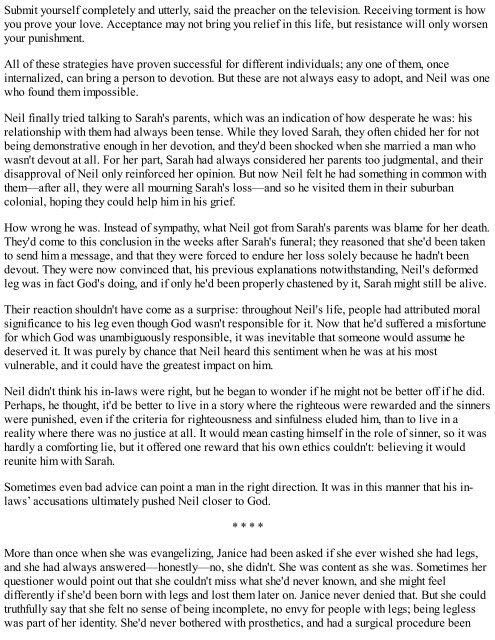Create successful ePaper yourself
Turn your PDF publications into a flip-book with our unique Google optimized e-Paper software.
Submit yourself completely and utterly, said the preacher on the television. Receiving torment is how<br />
you prove your love. Acceptance may not bring you relief in this life, but resistance will only worsen<br />
your punishment.<br />
All of these strategies have proven successful for different individuals; any one of them, once<br />
internalized, can bring a person to devotion. But these are not always easy to adopt, and Neil was one<br />
who found them impossible.<br />
Neil finally tried talking to Sarah's parents, which was an indication of how desperate he was: his<br />
relationship with them had always been tense. While they loved Sarah, they often chided her for not<br />
being demonstrative enough in her devotion, and they'd been shocked when she married a man who<br />
wasn't devout at all. For her part, Sarah had always considered her parents too judgmental, and their<br />
disapproval of Neil only reinforced her opinion. But now Neil felt he had something in common with<br />
them—after all, they were all mourning Sarah's loss—and so he visited them in their suburban<br />
colonial, hoping they could help him in his grief.<br />
How wrong he was. Instead of sympathy, what Neil got from Sarah's parents was blame for her death.<br />
They'd come to this conclusion in the weeks after Sarah's funeral; they reasoned that she'd been taken<br />
to send him a message, and that they were forced to endure her loss solely because he hadn't been<br />
devout. They were now convinced that, his previous explanations notwithstanding, Neil's deformed<br />
leg was in fact God's doing, and if only he'd been properly chastened by it, Sarah might still be alive.<br />
Their reaction shouldn't have come as a surprise: throughout Neil's life, people had attributed moral<br />
significance to his leg even though God wasn't responsible for it. Now that he'd suffered a misfortune<br />
for which God was unambiguously responsible, it was inevitable that someone would assume he<br />
deserved it. It was purely by chance that Neil heard this sentiment when he was at his most<br />
vulnerable, and it could have the greatest impact on him.<br />
Neil didn't think his in-laws were right, but he began to wonder if he might not be better off if he did.<br />
Perhaps, he thought, it'd be better to live in a story where the righteous were rewarded and the sinners<br />
were punished, even if the criteria for righteousness and sinfulness eluded him, than to live in a<br />
reality where there was no justice at all. It would mean casting himself in the role of sinner, so it was<br />
hardly a comforting lie, but it offered one reward that his own ethics couldn't: believing it would<br />
reunite him with Sarah.<br />
Sometimes even bad advice can point a man in the right direction. It was in this manner that his inlaws’<br />
accusations ultimately pushed Neil closer to God.<br />
* * * *<br />
More than once when she was evangelizing, Janice had been asked if she ever wished she had legs,<br />
and she had always answered—honestly—no, she didn't. She was content as she was. Sometimes her<br />
questioner would point out that she couldn't miss what she'd never known, and she might feel<br />
differently if she'd been born with legs and lost them later on. Janice never denied that. But she could<br />
truthfully say that she felt no sense of being incomplete, no envy for people with legs; being legless<br />
was part of her identity. She'd never bothered with prosthetics, and had a surgical procedure been

















